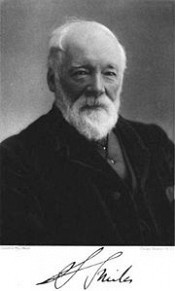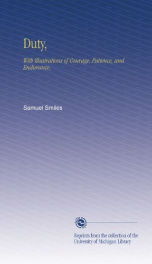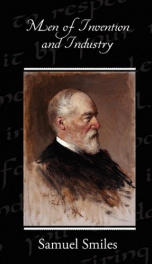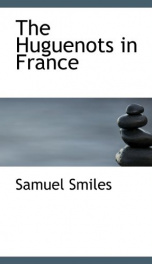Smiles Samuel

Samuel Smiles (23 December 1812 – 16 April 1904), was a Scottish author and reformer. Born in Haddington, the son of Samuel Smiles of Haddington and Janet Wilson of Dalkeith, Smiles was one of eleven surviving children. The family were strict Cameronians. He left school at the age of 14 and was apprenticed to a doctor, an arrangement that eventually enabled Smiles to study medicine at the University of Edinburgh. His father died in the cholera epidemic of 1832, but Smiles was enabled to continue with his studies, supported by his mother who kept running the family shop selling hardware, books, etc, firm in the belief that "The Lord will provide". Her example, working ceaselessly to support herself and his nine younger siblings, was a strong influence on his future life, though he developed a more benign and tolerant outlook somewhat at odds with his Cameronian forebears [1]. While studying and after graduating, he campaigned for parliamentary reform, contributing articles to the Edinburgh Weekly Chronicle and the Leeds Times. Samuel married Sarah Ann Holmes Dixon in Leeds in December 7, 1843. They had three daughters, Janet, Edith and Lillian, and two sons, William and Samuel. In his late teens, Samuel junior contracted a lung disease, and his father was advised to send him on a long sea voyage. The letters young Samuel wrote home, and the log he kept of his journey to Australia and America between February 1869 and March 1871, were later edited by his father and published in London in 1877, under the title 'A Boy's Voyage Round the World'. Samuel senior's grandchildren include Sir Walter Smiles, an Ulster Unionist Party MP. Through this family, Samuel Smiles is also the great-great-grandfather of popular explorer Bear Grylls. In 1838, he was invited to become the editor for the Leeds Times, a position which he accepted and filled until 1845. In May 1840, Smiles became Secretary to the Leeds Parliamentary Reform Association, an organisation that held to the six objectives of Chartism: universal suffrage for all men over the age of 21; equal-sized electoral districts; voting by secret ballot; an end to the need of MPs to qualify for Parliament, other than by winning an election; pay for MPs; and annual Parliaments. In 1845, Samuel Smiles left the Leeds Times and became secretary to the Leeds and Thirsk Railway and then, nine years later, the South Eastern Railway. In 1866, he left this position to be president of the National Provident Institution, but left in 1871, after suffering a debilitating stroke. He recovered from the stroke, eventually learning to read and write again, and he even wrote books after his recovery. He died in Kensington and was buried in Brompton Cemetery. As editor of the Leeds Times, he advocated radical causes ranging from women's suffrage to free trade to parliamentary reform. But by the late 1840s, Smiles became concerned about the advocation of physical force by Chartists Feargus O'Connor and George Julian Harney, though he seems to have agreed with them that the movement's current tactics were not effective, saying that "mere political reform will not cure the manifold evils which now afflict society." In the 1850s he seems to have completely given up on parliamentary reform and other structural changes as a means of social advance. For the rest of his career, he advocated individual self improvement. Smiles is best known today as the writer of books extolling virtues of self help, and biographies lauding the achievements of "heroic" engineers. Smiles' self-help books have been cited as influential on the New Thought Movement in late 19th century America and England, and, in particular, on the career of the New Thought author Orison Swett Marden, who said that his early ambition had been to become "the Samuel Smiles of America" Most of Smiles' biographies were contained in the four volume work, 'Lives of the Engineers', but he also wrote many other biographies. He selected the topics of his biographies as a means of emphasising his thesis of self help. These works have come to exemplify Victorian values for the modern reader. He received some criticism in his own time from socialists because of his emphasis on individual achievement. He was a prolific author of books and articles. The following is an incomplete list of his most important work. See Jarvis, below, for a full listing of his writings. The growth of industrial archaeology and history in Britain from the 1960s caused a number of these titles to be reprinted, and a number are available on the Web from such sources as Project Gutenberg, noted below. Jarvis maintains that Smiles should never be taken as the 'last word' on the lives of Victorian engineers. Aside from the accuracy of his statements (it is known, for example, that he was prone to making selective quotations from documents to show his subjects in the best light), there is the balance of his coverage. He tended to concentrate on civil engineering, to the detriment of mechanical engineering and invention. Present-day readers who rely upon an uncritical reading of Smiles may therefore be left with a lop-sided view of industrialisation during the Industrial Revolution and the Victorian era in Britain.
do you like this author?
What readers are saying
What do you think? Write your own comment on this book!
write a commentWhat readers are saying
What do you think? Write your own comment on this author!
write a commentBook list

Lives of the EngineersThe Locomotive. George and Robert Stephenson
Series:
Unknown
Year:
Unknown
Raiting:
3/5
Show more
add to favoritesadd In favorites

A Publisher and His FriendsMemoir and Correspondence of John Murray; with anAccount of the Origin and Progress of the House,1768-1843
Series:
Unknown
Year:
Unknown
Raiting:
4.5/5
Show more
add to favoritesadd In favorites

lives of boulton and watt principally from the original soho mss
Series:
Unknown
Year:
Unknown
Raiting:
5/5
Show more
add to favoritesadd In favorites
Book list

Lives of the EngineersThe Locomotive. George and Robert Stephenson
Series:
Unknown
Year:
Unknown
Raiting:
3/5
Show more
add to favoritesadd In favorites

A Publisher and His FriendsMemoir and Correspondence of John Murray; with anAccount of the Origin and Progress of the House,1768-1843
Series:
Unknown
Year:
Unknown
Raiting:
4.5/5
Show more
add to favoritesadd In favorites

lives of boulton and watt principally from the original soho mss
Series:
Unknown
Year:
Unknown
Raiting:
5/5
Show more
add to favoritesadd In favorites

life of a scotch naturalist thomas edward associate of the linnean society mi
Series:
Unknown
Year:
Unknown
Raiting:
5/5
Show more
add to favoritesadd In favorites

george moore merchant and philanthropist
Series:
Unknown
Year:
Unknown
Raiting:
5/5
Purchase of this book includes free trial access to www.million-books.com where you can read more than a million books for free. This is an OCR edition with typos. Excerpt from book: CHAPTER III. APPRENTICESHIP. But how was the battle of life to be fought ? How was George Moore to enter upon the struggle ? Where was he to begin ? In a very small way, as with all beginnings. A draper in Wigton, called Messenger, having intimated to Daniel Wilkinson that he wanted an active boy, Wilkinson immediately answered, " I know the very boy for you!" The boy was George Moore. Wilkinson, being a friend of the Moores, told them that Messenger would come out some day and see his proposed apprentice. John Moore did not welcome the suggestion. He did not wish his boy to be a draper, or anything of the sort. Why should he not " stick by the land," as his fathers had done before him ? He thought it rather humiliating that either of his sons should enter trade. Nevertheless Messenger came out to Mealsgate to see the boy. Old Moore would not hear of George going to Wigton. " If you want a boy take Thomas, but leave me George; he's far the better worker." Thomas, however, would not go. He was the eldest, and the heir to the property. If any one was to go, it must be George. Chap. nl.] APPRENTICESHIP AT WIGTON. 35 Mrs. Moore, George's stepmother, wished him to go. He was a favourite of hers, and seeing his eagerness, she strongly advised his father to let him go to Wigton. She did not think he could be of much use at Mealsgate. He would hang on to the estate; and after all he could never rise much above the rank of farm-servant. Besides, George reiterated his determination to leave home. He could not get even the wages that he earned on the farm. He wanted to do something for himself. He would go to Wigton. In the meantime Messenger had been looking into the lad's face. " I like the look of him very much," said he to his father. " He is strong and active. He's ...
Show more
add to favoritesadd In favorites

duty with illustrations of courage patience and endurance
Series:
Unknown
Year:
Unknown
Raiting:
4/5
This volume is produced from digital images created through the University of Michigan University Library's preservation reformatting program. The Library seeks to preserve the intellectual content of items in a manner that facilitates and promotes a variety of uses. The digital reformatting process results in an electronic version of the text that can both be accessed online and used to create new print copies. This book and thousands of others can be found in the digital collections of the University of Michigan Library. The University Library also understands and values the utility of print, and makes reprints available through its Scholarly Publishing Office.
Show more
add to favoritesadd In favorites

Self help; with illustrations of conduct and perseverance
Series:
Unknown
Year:
Unknown
Raiting:
3.5/5
Show more
add to favoritesadd In favorites

Men of Invention and Industry
Series:
Unknown
Year:
Unknown
Raiting:
4/5
Samuel Smiles was a 19th century Scottish author and reformer. In 1838 he became the editor for the Leeds Times and in 1840 he became secretary to the Leeds Parliamentary Reform Association. Smiles advocated causes ranging from women's suffrage, free trade, and parliamentary reform. Today Smiles is known as the writer of books on self-help, and biographies about the achievements of heroic engineers. The Table of Contents includes, Phineas Pett: beginnings of English shipbuilding -- Francis Pettit Smith, practical introducer of the screw propeller -- John Harrison, inventor of the marine chronometer -- John Lombe, introducer of the silk industry into England -- William Murdock, his life and inventions -- Frederick Koenig, inventor of the steam-printing machine -- The Walters of the "Times": invention of the Walter press -- William Clowes: book-printing by steam -- Charles Bianconi: a lesson of self-help in Ireland -- Industry in Ireland : through Connaught and Ulster to Belfast -- Ship-building in Belfast / by E.J. Harland, engineer and shipbuilder -- Astronomers and students in humble life : a new chapter in the "Pursuit of knowledge under difficulties".
Show more
add to favoritesadd In favorites

The Life of Thomas Telford; civil engineer with an introductory history of roads and travelling in Great Britain
Series:
Unknown
Year:
Unknown
Raiting:
3/5
Show more
add to favoritesadd In favorites

Jasmin: Barber, Poet, Philanthropist
Series:
Unknown
Year:
Unknown
Raiting:
4/5
Jasmin: Barber, Poet, Philanthropist. please visit www.valdebooks.com for a full list of titles
Show more
add to favoritesadd In favorites

Industrial Biography, Iron Workers and Tool Makers
Series:
Unknown
Year:
Unknown
Raiting:
2.5/5
Show more
add to favoritesadd In favorites

The Huguenots in France
Series:
Unknown
Year:
Unknown
Raiting:
4.5/5
Samuel Smiles (1812-1904), was a Scottish author and reformer. In 1838, he was invited to become the editor for the Leeds Times. In 1845, he left the Leeds Times and became secretary to the Leeds and Thirsk Railway and then, nine years later, the South Eastern Railway. In 1866, he left this position to be president of the National Provident Institution. As editor of the Leeds Times, he advocated radical causes ranging from women's suffrage to free trade to parliamentary reform. He is best known today as the writer of books extolling virtues of self help, and biographies lauding the achievements of "heroic" engineers. His self-help books have been citied as influential on the New Thought Movement in late 19th century America and England. His works include: Self- Help: With Illustrations of Conduct and Perseverance (1859), Industrial Biography: Iron Workers and Tool Makers (1863), The Life of Thomas Telford (1867), Character (1871), Thrift (1875), Men of Invention and Industry (1874), Jasmin: Barber, Poet, Philanthropist (1891) and A Publisher and His Friends: Memoir and Correspondence of John Murray (1891). --This text refers to an alternate Paperback edition.
Show more
add to favoritesadd In favorites
What readers are saying
What do you think? Write your own comment on this author!
write a commentif you like Smiles Samuel try:
readers also enjoyed
What readers are saying
What do you think? Write your own comment on this author!
write a commentGenre
if you like Smiles Samuel try:
readers also enjoyed
Do you want to read a book that interests you? It’s EASY!
Create an account and send a request for reading to other users on the Webpage of the book!

